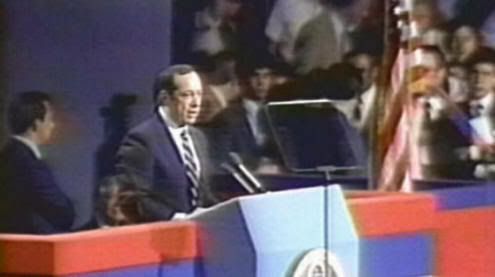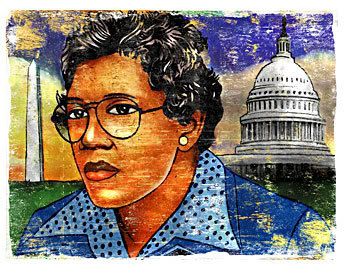
So when did you first realize our country was led by liars? Was there a particular incident, campaign or speech resulting in an epiphany? Did a cynical role model let you know our country’s decision makers could not be trusted to tell the truth?
For me it was at the age of fifteen in 1984. I was watching television when a campaign commercial for Mary Mochary, who challenged New Jersey incumbent Senator Bill Bradley, was aired. On screen appeared President Ronald Reagan sitting behind his desk at the oval office. I’ve tried to find a transcript or even footage of this commercial online but haven’t had any luck. So, I’m relying on memory.
As I remember it Reagan said,
“I’m not the sort of fellow to tell another person how to vote, but I support Mary Mochary.” It was something like that. And Reagan had this self-effacing aw shucks expression when he said it. I later learned Reagan aired similarly scripted commercials on behalf of other Republican candidates that year.
It just amazed me how an American president, arguably the most political persona in the world could say with a straight face,
“I’m not the sort of fellow to tell another person how to vote.” At fifteen I was politically aware. I knew Reagan was a former governor of California and had previously campaigned for president before defeating Jimmy Carter in 1980. Hence, this was somebody who told people who to vote for quite often.
The lie itself was harmless. It wasn’t about arms for hostages, the Contras or the phony war on drugs. Nevertheless, the memory stands out as the moment when I internalized how politicians would even shamelessly lie about small things. And we therefore had to listen to their words with critical ears because if they could lie about something small, a big lie was just around the corner.
Three years later, I was disillusioned when California Senator Alan Cranston was exposed as one of the infamous Keating Five. In the summer of ’86, I sent Cranston $100 which at seventeen wasn’t peanuts. Cranston was in a tough reelection fight and I admired his stance on nuclear disarmament. So in 1987, when I watched Senator Warren Rudman of New Hampshire who sat on the Senate Ethics Committee roughly question Cranston in public, I was devastated. I had believed in him.
In 1992 I supported Paul Tsongas for president. I disagreed with his economic positions but believed Tsongas was the most honest candidate seeking the Democratic Party’s nomination that year. Sadly, Tsongas wasn’t honest about his recovery from cancer and he died in 1997.
You get older and learn life isn’t always so black and white. None of us are pure and the best of us have moral lapses. And in a world of nuance, lies become easy to rationalize. Many of us lie in our personal and professional lives. We lie to our boss as our boss lies to us. We tell “white lies” to our family and friends. In the movie “The Departed,” Vera Farmiga’s character admitted she lied to keep things on an “even keel.” And she proceeded to live a lie while cheating on Matt Damon. Later she dumped Matt Damon upon learning about
his lies. More often than not the “even keel” Farmiga’s character refers to are lies to preserve a self-serving image we’ve constructed.
In America our politicians and military leadership have lied for all kinds of reasons. In 1960, President Eisenhower was caught in a lie following the
Gary Powers U2 spy plane incident. Embarrassing but Americans didn’t hold it against Eisenhower. It was the Cold War and the public believed their president had his heart in the right place about protecting our national security.
John Kennedy partly won the presidency in 1960 by lying about a “missile gap” with the Soviet Union that didn’t exist. President Lyndon Johnson lied about the pretext for war in Vietnam while his Pentagon misinformed the public about our "success." President Nixon lied about Vietnam as well as not being a crook and President Clinton practiced in front of mirror before
telling the world,
“I did not have sexual relations with that woman, Ms. Lewinsky.” One person’s shit is another’s ice cream and some lies are considered necessary. Americans were largely in the dark about FDR’s polio and he lied about his true intentions during World War Two. He promised to keep America out and manipulated behind the scenes as best he could to put us in the conflict. Yet FDR’s place in history is secure. The Axis Powers had to be defeated to ensure our survival and a different president might have appeased Hitler. Hence we don’t judge FDR harshly for misleading about his health or war plans. FDR’s lies are deemed good lies.
Americans don't judge Clinton overly harshly either. Many of us are guilty of similar offenses and would’ve lied to protect our marriages, families and reputations. His testimony about the word “is” will always remain the butt of jokes but most Americans would gladly take him back. A friend recently confided to me that his marriage ended when his wife caught him in the act while he cheated on her. Unable to come up with a convincing lie he said,
“honey it’s not what it looks like.” I don’t judge him harshly for it. Nor am I judgmental about Clinton or Vera Farmiga’s character. They didn’t lie maliciously. For them lies were shields against human frailty.
So, one could say that lies are simply part of the human condition and our leaders reflect this reality. Nonetheless, from my vantage point, a culture of destructive lying has become dangerously pervasive in recent years. This decade, corporations such as Enron shamelessly lied to their shareholders and dutiful employees,
Jayson Blair hoodwinked the
New York Times and Dick Cheney stood before the Republican Party National Convention in 2000 and promised the country a
“stiff dose of the truth.”Ironically, the same President Bush who promised a restoration of honor and integrity has become synonymous with lies – too many to summarize here. His Attorney General can’t keep track of his own lies. Former CIA director George Tenet has written a memoir whining about his “slam dunk” lie being taken out of context. And there are the shameful lies from the Pentagon about
Pat Tillman and Jessica Lynch. If that's not bad enough, the Bush Administration is pathologically devoted to covering up evidence about global warming. From Kartina to Iraq, how many people have died because of all these lies? And how many more deaths are to come?
Recently, my Dad sagely observed to me in a telephone conversation,
“None of this is new. I’ve seen all this stuff before. All politicians are full of it. They’ll always be full of it. That’s life.” Perhaps. And when it comes to life and politics, my Dad, like many Dads is a human oracle of experience and wisdom. But I remain optimistic because within this morass of deceit, a counter-culture of truth is emerging.
As our institutions and the mainstream media fail to deliver the truth, a hunger for reality is expressing itself among the people. Hence, we have the ascendancy of blogs. It’s undisciplined and irreverent out here. One has to be a discriminating consumer among thoughtful bloggers and those who are simply rhetorical bomb throwers. But there are golden nuggets of truth among ordinary people challenging elites about their destructive lies, disinformation and exploitation.
One of my favorite blogs may not be known to you and belongs to a dear personal friend,
Kaiser Permanente – Corporate Ethics. My friend was an employee of Kaiser who lost her job because she’s an honest person. Her story is a long and complicated one and best learned from reading her blog. Her life is hard and she is unable to post as frequently as she’d like. Nonetheless, her site has become a repository for exposing the lies and cover-ups of Kaiser Permanente.
Not surprisingly, Kaiser mobilized their legal and PR machine to personally destroy her. But she perseveres as a courageous beacon of light against their greed culture of lies and malfeasance. More than once I observed to her that Kaiser reminds me of the Bush Administration. And as she put it to me once,
“That’s because the people inside the Bush Administration come from corporate cultures such as Kaiser where truth can be tossed away like a can of tuna fish.” As only she could put it. It’s largely because of her inspiration I joined the blogosphere fray.
And there are the bloggers we know about such as JoshMarshall of
Talking Points Memo, who pushed the story of the unscrupulous dismissal of the U.S. Attorneys. Marshall’s success at emphasizing a story the mainstream media initially ignored, illustrate how the façade of deceit so dutifully served and enabled by inside the beltway pundits such as David Broder, Joe Klein and David Brooks is finally cracking.
And I’m a part of it too in my own way. Of course I’m not the sort of fellow to tell another person how to vote.
*****************************************************************************
ADDENDUM: My thanks to Mike Finnigan for including me in his most recent blogroundup on
Crooks and Liars.
 In the age of Barack Obama, both the Republican Party as well as the South appear marginalized and out of step with the rest of America. Yet it wasn’t so long ago that the South represented the foundation of America’s conservative hegemony. Starting with Dwight Eisenhower in 1952, the Republican Party prevailed in nine out of the next fourteen presidential elections with a reliable Southern base.
In the age of Barack Obama, both the Republican Party as well as the South appear marginalized and out of step with the rest of America. Yet it wasn’t so long ago that the South represented the foundation of America’s conservative hegemony. Starting with Dwight Eisenhower in 1952, the Republican Party prevailed in nine out of the next fourteen presidential elections with a reliable Southern base.


